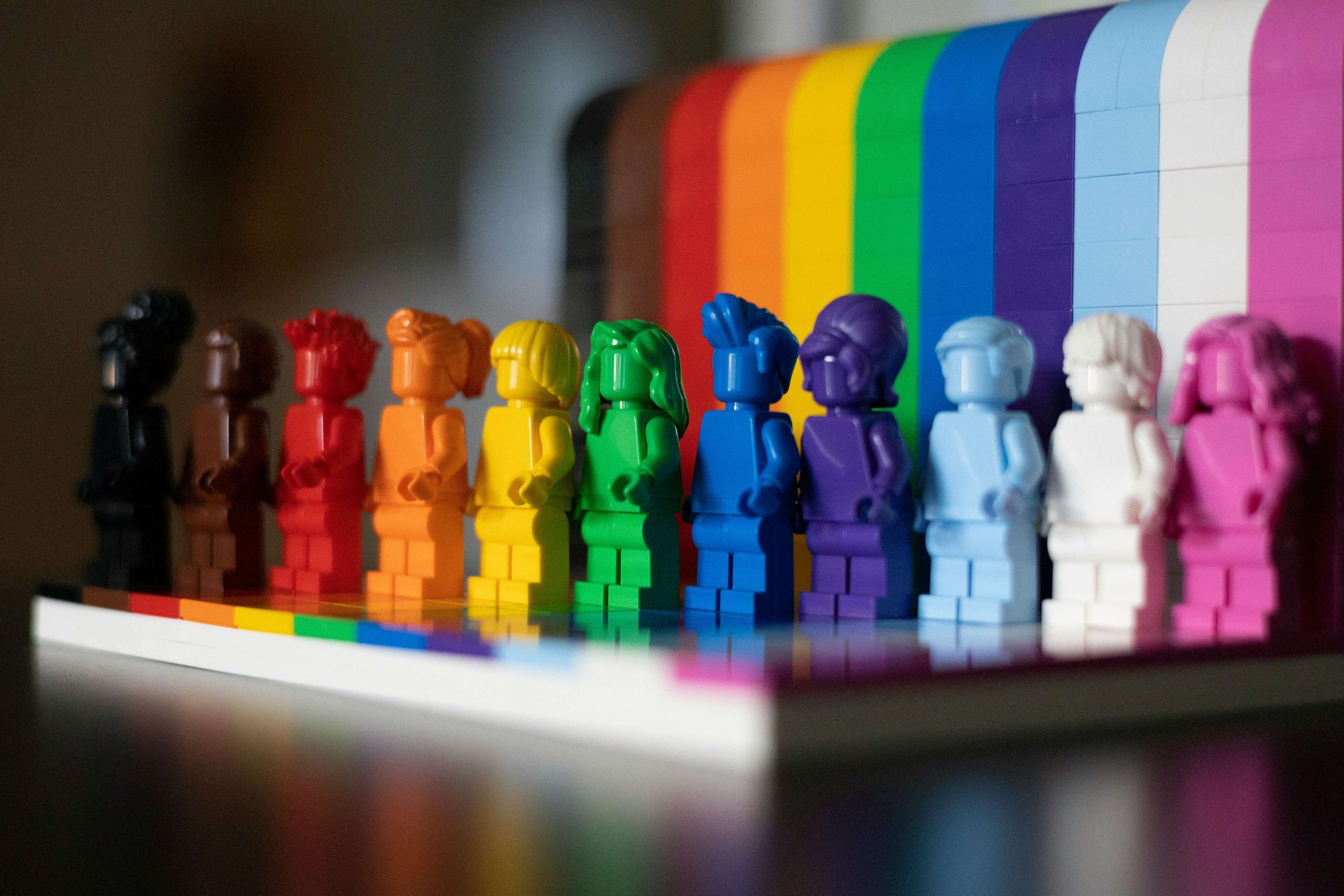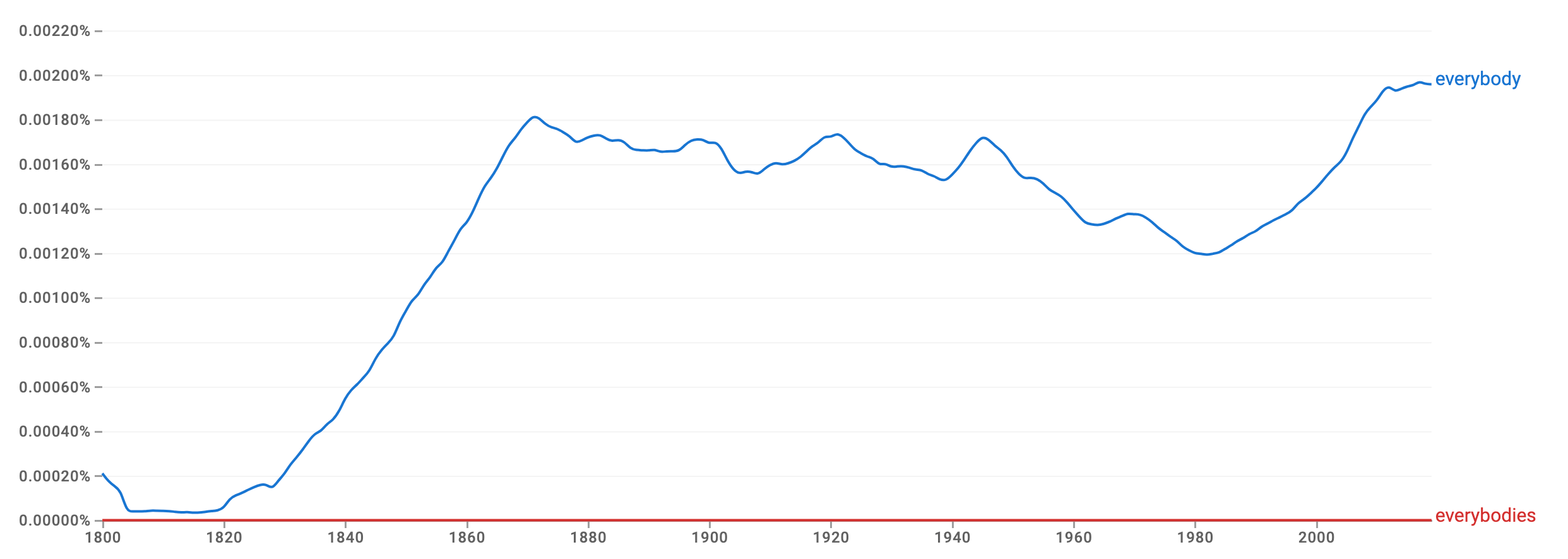- "Everybodies" is not a word in standard English.
- "Everybody" is a pronoun that can only be singular.
❌ Everybodies is invited to the party this Saturday.
✅ Everybody is invited to the party this Saturday.
Notice how in this sentence, "everybody" is used with the singular verb "is." That's because "everybody" is always singular.
What does "everybody" mean?
"Everybody" is a singular pronoun that refers to every person, each individual, or all people in a group. It is used to talk about a complete set of individuals, without exception. "Everybody" is often used interchangeably with "everyone" in sentences.
Common phrases using "everybody"
- Everybody's doing it: Suggests that a behavior or action is popular or widespread.
- Everybody's welcome: Indicates that all individuals are invited or accepted without exception.
- Everybody who's anybody: An idiomatic expression used to refer to people who are considered important, influential, or prominent within a particular group or field.

The use of "everybody" and "everybodies" over time
The Ngram graph below shows how often "everybody" and "everybodies" have been used from the 1800s to the 2000s. "Everybody" has experienced an increase in use in the last 40 years, while the incorrect term "everybodies" has always seen nearly zero use.

How to pronounce "everybody"
In American English, "everybody" is pronounced like "eh·vr·ee·buh·dee."
In British English, "everybody" is pronounced like "eh·vree·bo·dee."
These are just the standard pronunciations, and there may be slight variations depending on regional accents and individual speech patterns.
Why would we write "everybodies"?
Some people might incorrectly write "everybodies" due to confusion or misunderstanding about how the word "everybody" functions grammatically. "Everybody" is a singular indefinite pronoun, meaning it refers to a single group or collection of individuals. As such, it doesn't require the plural "s" at the end.
However, the incorrect use of "everybodies" could stem from an attempt to pluralize the word to refer to multiple groups or collections of individuals. Additionally, it could be a simple spelling mistake or a result of trying to make "body" into the plural "bodies" instead of recognizing "everybody" as a single, indivisible unit.
Enlist the help of an AI proofreader to ensure that your written work has no spelling or grammar errors.
Example sentences of the misuse of "everybody" as "everybodies"
- "Everybodies" is incorrect; the proper term is "everybody," which is a singular pronoun.
- Please note that "everybodies" is a common mistake; the correct form is "everybody," without the plural "s."
- Using "everybodies" instead of "everybody" is grammatically incorrect and should be avoided in formal writing.
- There seems to be a misunderstanding; "everybodies" is not a valid word, but "everybody" is the correct singular form.
- Remember to use "everybody" as the singular pronoun instead of "everybodies" to convey the collective sense of all individuals.
Example sentences of "everybody"
- Everybody is excited about the upcoming event.
- Everybody needs to submit their reports by the end of the week.
- For the surprise party, everybody contributed something special.
- At the meeting, everybody shared their ideas and opinions.
- Everybody was amazed by the magician's tricks.
- The teacher reminded everybody to hand in their homework assignments.
- Everybody in the class received an award for their hard work.
- After the storm, everybody helped clean up the neighborhood.
- The coach told everybody to give their best effort in the game.
- Everybody wants to be successful in life.
Synonyms for "everybody"
- Everyone
- Every person
- Each person
- All
- Every single person
- Every individual
- All people
- The whole group
FAQ
Is there a plural for "everybody"?
No, "everybody" is an indefinite pronoun that refers to a group of people as a whole, and it doesn't have a plural form. It's a singular term that already encompasses all individuals in a group collectively. If you need to refer to multiple groups of people, you would typically use a different phrase or construction, such as "all the people" or "everyone in all the groups."
What is the meaning of "everybody's"?
"Everybody's" is a contraction of "everybody is" or "everybody has." For example, "Everybody's happy" means "Everybody is happy." "Everybody's" may also be used as a possessive adjective to indicate ownership or possession by each individual within a group. For example, "Everybody's opinions" refers to the opinions held by each individual in the group.

Want to sound like a native speaker?
Engram’s AI-powered grammar checker makes your English sound like a native speaker’s, suggesting natural English expressions on top of fixing grammar, spelling, punctuation, word order, and vocabulary.

References:















